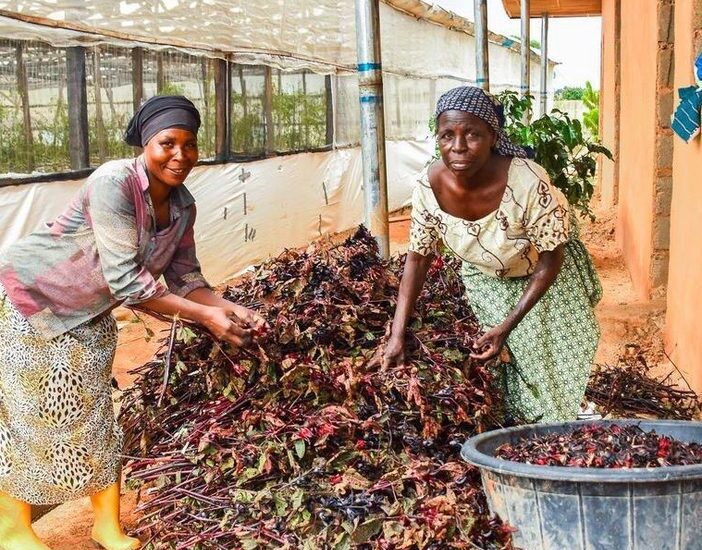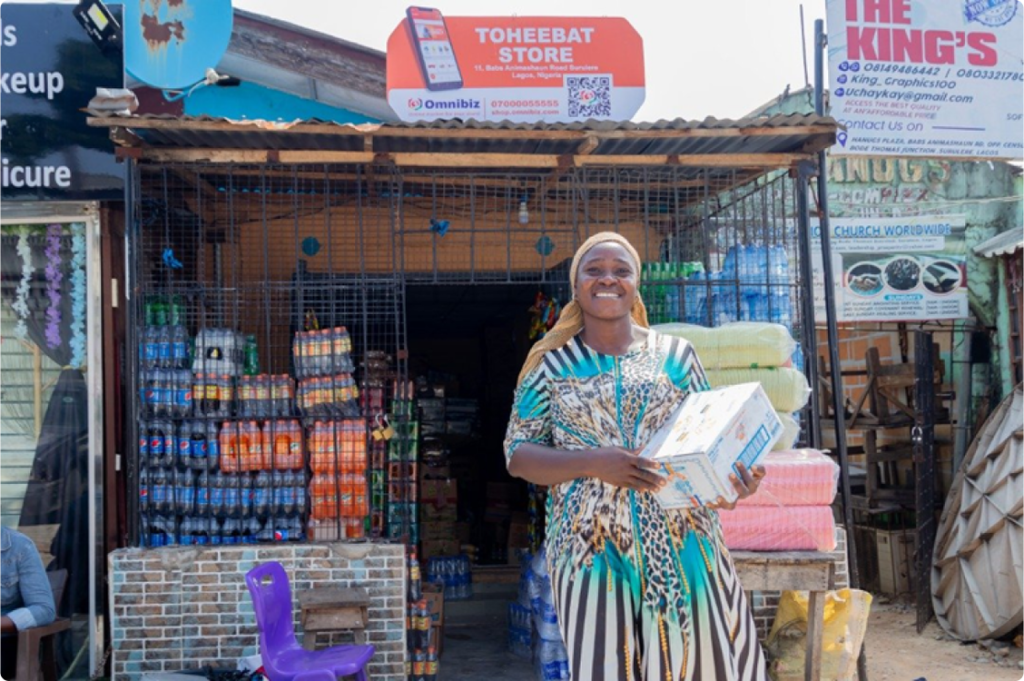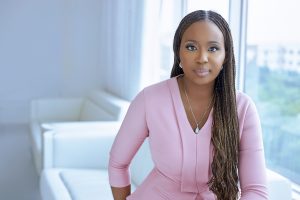At the age of 29, Adesuwa Okunbo Rhodes founded one of the few women-owned investment companies in Africa. With women in Africa recieving only a tiny amount of investment money, yet outperforming men on stock exchanges, she believes it’s her divine mission to flow capital to marginalised women entrepreneurs, who in turn uplift their communities. For International Women’s Day, Alliance speaks to Rhodes ahead of her second fund raise.
Since the age of 18, investment manager Adesuwa Okunbo Rhodes – Nigeria’s Impact Investor of the Year 2023 (Impact Investors Foundation) and 2X Global Woman Fund Manager of the Year (SuperReturn Africa) has learned her trade working for some of the biggest investment companies around the globe.
Some years later, when she got a glimpse into the world of impact investing and how money could be used for good, it strengthened her resolve to manage capital herself, so she could allocate it for positive social change. In 2019, she set up Aruwa Capital Management to invest in African women’s enterprises. Her first target raise in 2022 (Fund I) drew interest from big name global investors and was over-subscribed.
Rhodes’ mission is to channel growth capital into indigenous businesses that have demonstrated success, and are either led by women or gender diverse teams, as well as those that employ large numbers of women or support women in the community.
Her first fund invests in essential goods and services that improve women’s lives – specifically within healthcare, financial services, renewable energy and clean tech, and the central consumer goods spaces.
Impact investment in African women’s enterprise
Her portfolio boasts businesses such Koolboks – which offers pioneering renewable energy refrigeration for off-grid areas, a critical component for vaccine storage. Another, wellness brand AgroEknor International, supports women farmers through its business model as a fair-trade exporter of non-GMO hibiscus. There is also OmniBiz, which helps more than 65,000 retailers get easier access to stock and market insights.
Aruwa’s second fund (Fund II) – a $40m USD pot – is designed to offer increased support and investment to women’s enterprises. At least half of the ten investees from the first fund raised follow-on capital elsewhere to continue their development. ‘With Fund Two, we want to be there to double down for businesses that are profitable and businesses that are growing, being in a position where we can give more and continue to support them for longer,’ says Rhodes.
Hailing from Nigeria, where her name Adesuwa signifies “centre of wealth”, Rhodes has long been captivated by the dynamics of finance and its social impact. ‘From a very young age, I’ve been fascinated by money and how finance interacts with the world,’ she tells us. ‘I think I’m living out my God-given purpose to change the narrative for women in Africa that have typically been overlooked and underserved.’
Her early career in prestigious financial institutions such as JP Morgan, as well as her economics studies at university, provided her with a broad view of the investment landscape. She discovered the transformative power of impact investing in Africa in a defining moment while working at TLG Capital. During her employment there, she had the opportunity to make an investment into antiretroviral drugs in Uganda. It marked a personal investment success and a broader social triumph, leading her to set up her own investment business.
‘We have tangible evidence of our impact, which is facilitating the raise for our $40 million USD Fund II’ – Adesuwa Okunbo Rhodes
Founding Aruwa was a bold step into the realm of gender lens impact investing. It has drawn the attention and support of notable investors such as the Visa Foundation and the Mastercard Foundation Africa Growth Fund. But Rhodes’ investment acumen underscores a staggering discrepancy.
As noted by the Alliance for Financial Inclusion’s executive director, Alfred Hannig, Africa is home to the highest percentage of women entrepreneurs globally, yet they suffer the lowest rates of financial support for their SMEs. Harvard University’s Centre for African Studies echoes this, stating that women run more than 40 per cent of SMEs in Africa, yet they face a $42 billion funding gap.
Why men receive more investment than women
The contrast with funding for men’s enterprises in Africa is stark. As reported in the Substack publication, Africa: The Big Deal, in 2023 solo male founders or all-male teams secured 85 per cent of all funding. When including mixed-gender teams, this figure jumps to 98 per cent, leaving solo woman founders or all-women teams with a paltry 2.3 per cent of total funding (or 7 per cent at most, says Asoko Insights). Yet, according to Bloomberg, businesses led by women are outperforming men’s on Africa’s 24 stock exchanges.
Rhodes reflects on this paradox with a blend of frustration and determination: ‘We can manage money; we can make the same returns that others do. So why are African women not getting good access to capital? It’s because we don’t have enough women allocating capital.’
The Harvard Business Review found that women in business are frequently questioned about loss prevention, whereas men are more likely to be asked about prospects for growth
Vera Songwe, former head of the UN Economic Commission for Africa, has highlighted another astounding figure (from 2019) – just 1.3 per cent of the $69 trillion global assets are under management by women. But, she notes, on average those women actually deliver a higher [return] than men.
‘It’s a big mission of mine with Aruwa: to show that women make good business decisions,’ Rhodes shares. ‘But many women who aspire to lead funds face discouragement. They find their proposals are not taken as seriously as their male counterparts.’ The Harvard Business Review found that women in business are frequently questioned about loss prevention, whereas men are more likely to be asked about prospects for growth.

Picture courtesy of Agroeknor, a fair trade hibiscus company which has recieved investment from Aruwa
Rhodes contends that this imbalance reflects a systemic bias that must be addressed. ‘The shift will only happen by emulating Aruwa’s approach — demonstrating the success of women-led investments so compellingly that it becomes impossible to maintain outdated biases. We’ve demonstrated robust financial returns and successful partial exits. We’ve also made significant strides in social impact, creating more than 700 direct jobs and influencing over 100,000 jobs both directly and indirectly.’
Social investment with proven returns
‘We now have a proven track record,’ Rhodes says. ‘We have tangible evidence of our impact, which is facilitating the raise for our $40 million Fund II. We’re grateful that many of our initial institutional investors are doubling down on their commitment to our second fund. We also have new interest from institutions and family offices across Europe, the U.S and Africa. This not only reflects the strong performance of Fund I but also sends a positive signal to new investors.’
She believes supporting women in Africa will uplift communities and highlights a striking statistic from the African Development Bank: ‘Women reinvest up to 90 per cent of their income back into the education, health, and nutrition of their families and communities, compared to up to 40 per cent for men. If you care about social impact, you should not be ignoring African women,’ she says.
Rhodes encapsulates the broader significance of Aruwa’s work. ‘It’s not just about finance: it’s about fostering a legacy of empowerment.’
Claudia Cahalane is Investments Editor at Alliance
A verion of this article originally appeared in Impact Entrepreneur Magazine





Comments (0)
QUI SOMMMES – NOUS ? L’Actions Communautaires pour le Développement de la Femme, en sigle ACODEFEM est une Organisation Non Gouvernementale de la société civile engagée à la promotion, à la protection et à la défense des droits des femmes et des filles, en vue de promouvoir la santé et droits reproductifs ainsi les meilleures stratégies d’autonomisation susceptibles de réduire la pauvreté sous toutes ses formes.